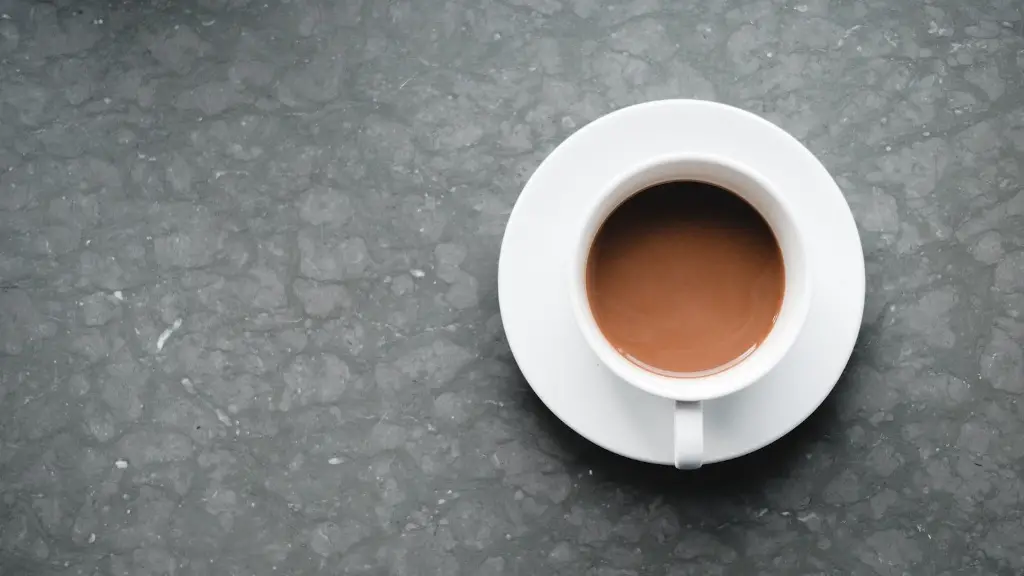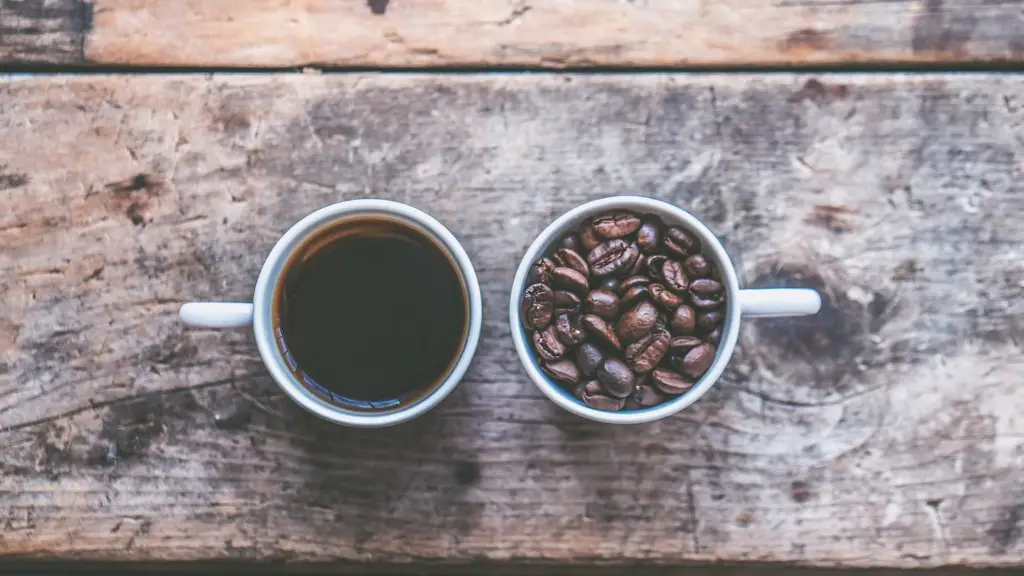NyQuil and coffee may not seem like an appealing combination, but for many people, these two household items can become a common pairing, especially in times of distress. Whether it’s due to sleep deprivation, a cold or flu, NyQuil and coffee provide a way to try and cope with their symptoms. But what actually happens when you mix these two substances together?
When it comes to caffeine and NyQuil, the big concern is whether or not the combination is safe. Unfortunately, there isn’t much research to answer this question and what’s out there can be contradictory. In general, experts and healthcare providers advise against mixing NyQuil and caffeine, citing the potential for increased side effects and possible interactions between the two drugs. NyQuil contains multiple active ingredients including acetaminophen, a pain reliever and fever reducer; dextromethorphan, a cough suppressant; and doxylamine succinate, an antihistamine. All of these ingredients, especially when taken together, can cause some adverse reactions when combined with caffeine.
The main danger of combining caffeine and NyQuil is the potential for central nervous system (CNS) stimulation. Caffeine is both a stimulant and have a sedating effect. NyQuil also has sedative effects due to its main active ingredient, doxylamine succinate. This combination can lead to overstimulation of the CNS, resulting in an elevated heart rate, dizziness, headaches, insomnia, restlessness, and anxiety. It is also important to note that excessive intake of caffeine can increase the risk of overdose or adverse reactions to the active ingredients in NyQuil.
There is also the potential for increased side effects of NyQuil when it is mixed with caffeine. Caffeine is a diuretic, meaning it can increase the amount of water that is lost from the body. When combined with NyQuil, this can lead to dehydration, as well as the potential for the ingredients to be excreted more quickly than usual. Additionally, caffeine can interfere with the body’s absorption of NyQuil, meaning the drug may not be as effective as it should be in treating symptoms.
Overall, it is advised not to mix caffeine and NyQuil due to the potential for adverse reactions and interactions. If you’re in need of a stimulant and/or a sedative, it is best to seek medical advice or to try an alternative approach to relief. For example, drinking a warm cup of tea with honey can be a great way to ease congestion and soothe a sore throat, while taking a hot bath or exercising can help to stimulate the body and relieve stress.
Caffeine and Drowsiness
When it comes to mixing NyQuil and caffeine, the effects don’t end there. The active ingredients in NyQuil can cause drowsiness, so drinking coffee or another caffeinated beverage can counteract these effects. This can lead to a “rebound effect” if too much caffeine is consumed, making you even more awake than before. This can make it difficult to maintain adequate sleep. Additionally, sudden increases or decreases in caffeine consumption can lead to caffeine withdrawal, which can cause headaches, fatigue, and nausea.
Caffeine has both short-term and long-term effects on the body. In the short-term, it can make you feel alert and focused, however it can also lead to increased heart rate and breathing. In the long-term, excessive caffeine consumption can lead to anxiety, irritability, and insomnia. It can also increase one’s risk of hypertension, heart disease, and stroke in the long-term.
For those looking for ways to cope with their symptoms without resorting to NyQuil and coffee, there are many other options available. Non-stimulant medicines such as ibuprofen and acetaminophen can help to relieve pain, while herbs and home remedies such as ginger and peppermint tea can help to soothe congestion and provide natural relief. Additionally, lifestyle modifications such as getting plenty of rest, drinking plenty of fluids, and avoiding too much sugar and processed foods can all help to reduce the severity of cold and flu symptoms.
Adverse Reactions
When it comes to mixing NyQuil and caffeine, it’s important to remember that everyone will respond differently to the combination. This is because everyone metabolizes caffeine at different speeds, depending on their body weight, age, gender, and other factors. Additionally, different combinations of medication can lead to different reactions. Therefore, it’s important to be aware of your body’s response to these substances, and to talk to a doctor before combining them.
Pairing NyQuil and caffeine can be risky for some people. Those who are pregnant or nursing, those with high blood pressure, heart problems, or anxiety, as well as those taking other medications, should all talk to their doctor before mixing NyQuil and caffeine. Additionally, people who are prone to negative reactions should consider avoiding this combination as well.
In conclusion, combining NyQuil and coffee is not advisable due to the potential side effects and interactions between the two drugs. Therefore, it’s best to seek medical advice or to try an alternative approach to temporary relief.
Caffeine Tolerance
Caffeine tolerance is another factor to consider when mixing NyQuil and caffeine. Caffeine tolerance is the body’s ability to adapt to the effects of caffeine over time. This means that, after long-term caffeine consumption, your body can become less sensitive to the effects of caffeine and you may need larger doses in order to experience the same effects as before.
Furthermore, the body can also become more efficient at metabolizing caffeine, which can lead to quicker absorption. This can make it difficult to tell how much caffeine is actually in your blood stream and can increase the risk for adverse reactions. Overall, it is important to be aware of your body’s tolerance to caffeine before combining it with NyQuil.
Additionally, it’s important to keep an eye on how much caffeine you consume overall. Too much caffeine can lead to negative side effects such as restlessness, irritability, anxiety, insomnia, and headaches. Therefore, it’s best to limit caffeine consumption to 400mg per day, or roughly 3-4 cups of coffee. Additionally, it’s best to avoid consuming caffeine late in the day or close to bedtime, as this can disrupt your sleep.
NyQuil Replacement Options
In general, it is best to seek alternative approaches to alleviating cold and flu symptoms before resorting to NyQuil and caffeine. For example, keeping your home clean and disinfected and washing your hands often can help to reduce your risk of infection. Additionally, drinking plenty of fluids, getting plenty of sleep, and eating a balanced diet can help to keep your immune system strong and ward off infections.
There are also many over-the-counter (OTC) medications that can offer relief. Ibuprofen and acetaminophen can both help to reduce fever and relieve pain, while decongestants such as pseudoephedrine and antihistamines such as diphenhydramine can help to relieve congestion. Additionally, many products such as Vicks VapoRub offer a topical solution to congestion.
If you’re looking for an OTC alternative to NyQuil, one option is a product called DayQuil. DayQuil contains similar active ingredients to NyQuil, including acetaminophen, dextromethorphan, and doxylamine succinate. However, the dosage of these ingredients is much lower compared to NyQuil. Additionally, DayQuil does not contain NyQuil’s sedative ingredient, levo-dromoran, making it a better option for daytime use.
Overall, it’s important to understand the potential risks associated with mixing NyQuil and caffeine. This combination can be dangerous, and can cause serious health risks such as elevated heart rate, headaches, insomnia, and dehydration. Therefore, it’s best to seek medical advice before combining NyQuil and caffeine, or to try alternative approaches to temporary relief.
Coffee OTC Alternatives
If you’re looking for an alternative to coffee, there are many options available. Herbal teas such as chamomile, hibiscus, and peppermint can all provide a naturally caffeinated boost. Additionally, there are several varieties of OTC energy drinks on the market that contain no caffeine, such as herbal energy drinks and green tea energy drinks.
If you’re looking for a caffeine-free energy boost, maca root is a great option. This herb, which is derived from a root vegetable found in Peru, has been used for centuries for its energizing and endurance-boosting properties. It is available in both powder and capsule form and can be added to smoothies, teas, and other beverages.
Another great option is L-theanine, an amino acid found naturally in green tea. L-theanine has been found to provide a relaxing, yet energizing effect and can also help to improve cognitive function. As an added bonus, L-theanine can also help to boost your body’s ability to burn fat.
Overall, it’s important to recognize the potential side effects of mixing NyQuil and caffeine and to find alternate methods of relief. There are numerous herbal and OTC alternatives available that can provide natural relief without the potential for side effects. So, before turning to NyQuil and caffeine, consider trying some of these alternatives for a safer and more effective way to relieve your symptoms.





